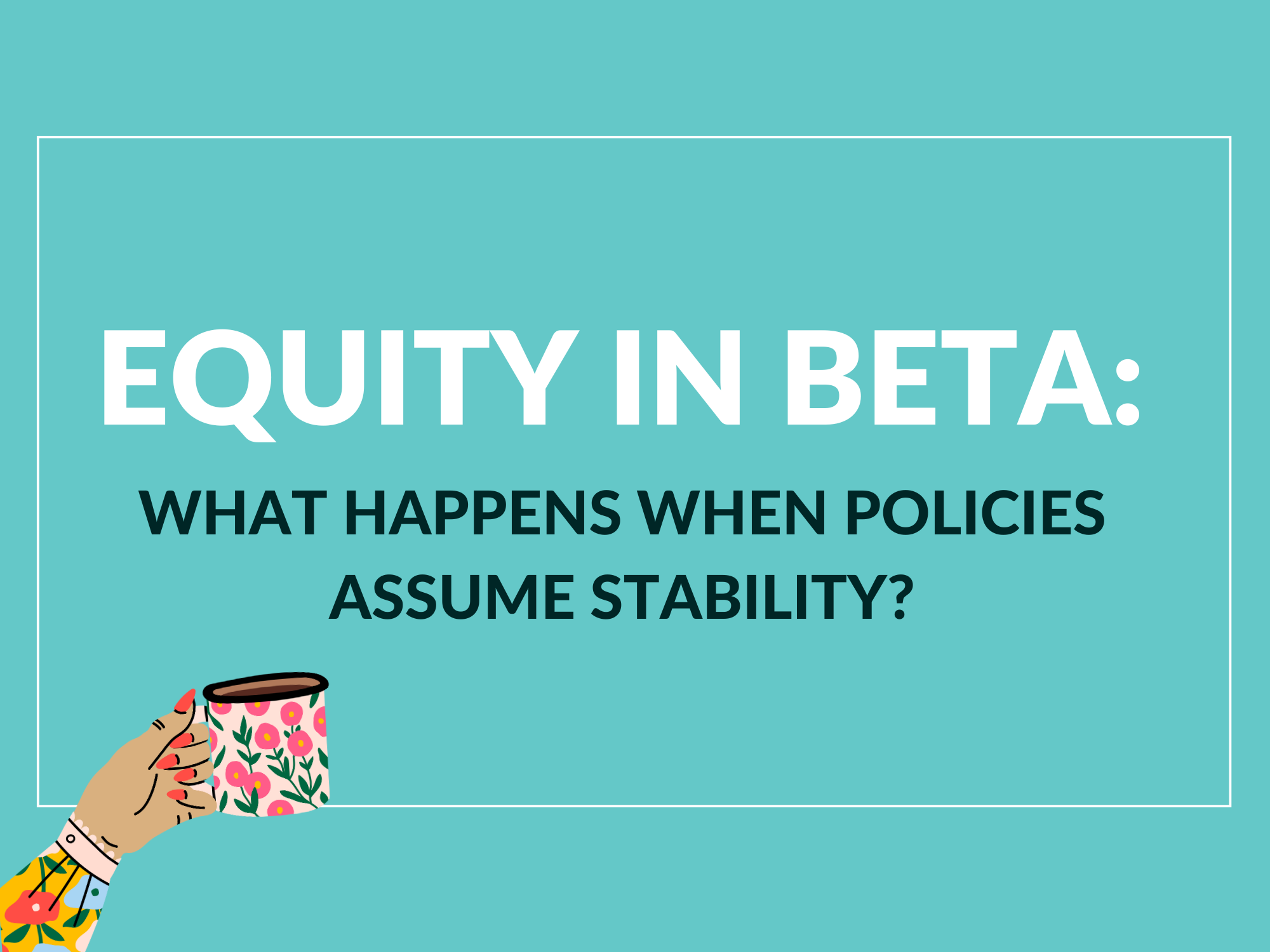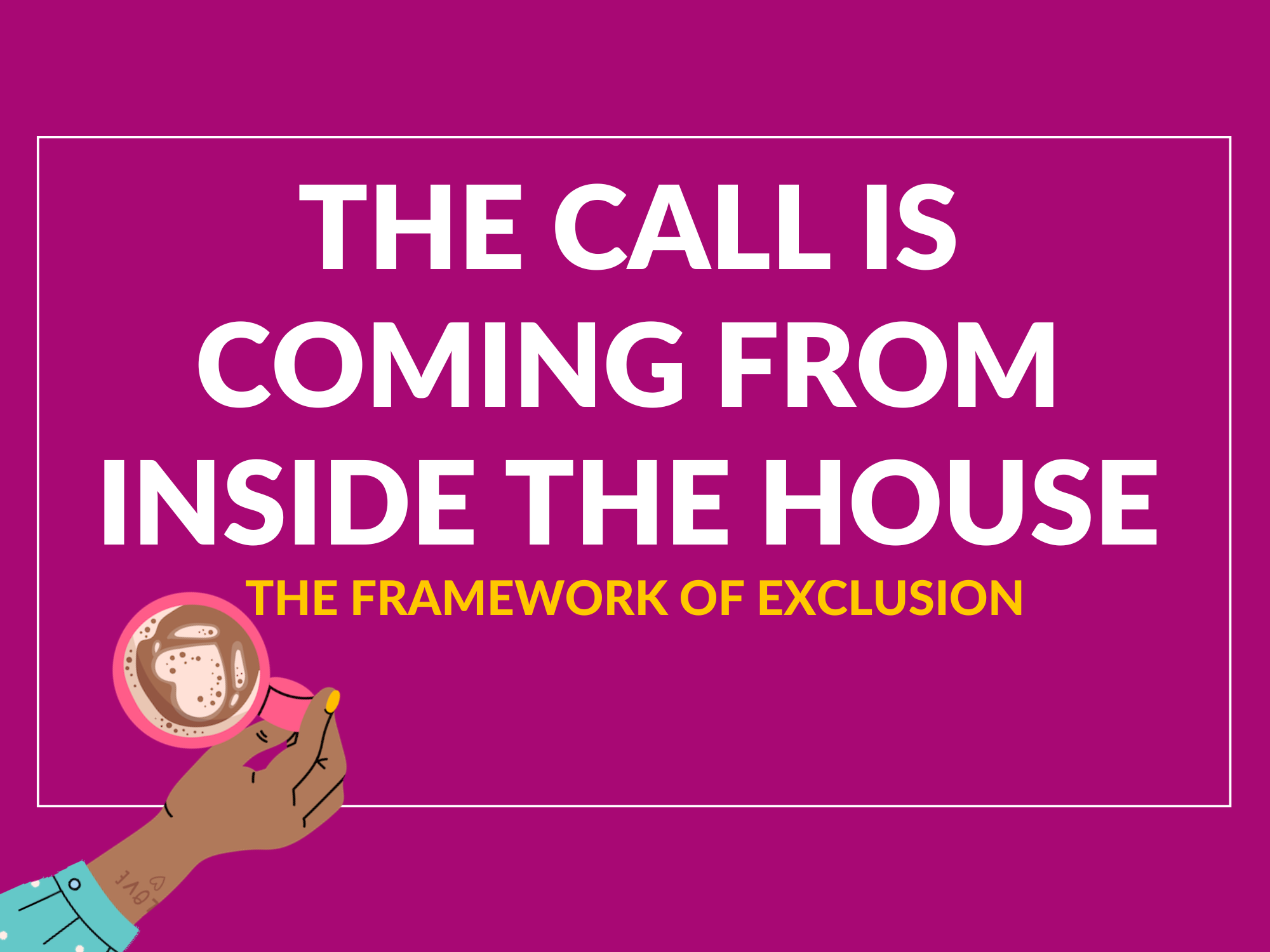Equity in Beta: What Happens When Policies Assume Stability?
QuakeLab’s latest blog examines how financial policies assume stability and shift risk to employees. Learn how to identify design bias in reimbursements, relocation, and training budgets, and how to redesign systems for fairness, efficiency, and retention.
How the sausage is made: Equity as a Technical Skill in practice
At QuakeLab, we think this is the perfect moment to talk about how equity work actually gets done. Not in values statements or training sessions, but in the everyday design of systems, policies, and services. We call this Equity as a Technical Skill.
Here’s a behind-the-scenes look at how we approach it, both inside organizations (as an employer) and outside organizations (through the services and products they provide).
Four things we were wrong about, and four things we still can’t figure out
There is a version of this work that rewards certainty. Certainty helps people feel confident in your leadership, it helps anchor a room when the conversation is difficult, it makes equity work look digestible, branded, and contained. But the longer we do this work, the more we have come to understand that certainty should be earned, not performed. Equity work is a form of applied social science, and like any serious discipline, it demands humility.
Can we actually build for everyone?
Designing for equity doesn’t mean spreading resources too thin in an attempt to serve every need simultaneously. We want to aim at dismantling what we call the Framework of Exclusion: the systemic design patterns that consistently leave out entire groups of people. This framework prioritizes dominant identities, often under the guise of perceived neutrality, while marginalizing everyone else.
Build the system: Not the workaround
When equity is not intentionally built into a public system, that system will default to protecting the status quo. That does not happen because people are careless or unkind. It happens because we have been taught to treat equity as a values statement or a communications issue, rather than as a practical design skill.
Acronyms that stress us out: AI and DEI
Laying out all the ways that AI is exasperating existing inequities or creating new ways we oppress the most marginalized - and then leaving us with the call to action of “just don’t do it”, feels insufficient and unproductive.
Workplace equity in Canada: A deep dive into benefits, accommodations, and career mobility
Simply put, the businesses that succeed will be those that create workplaces that not only attract talent but also empower employees to deliver the innovative, responsive solutions that keep their businesses competitive. In today’s world, how you design your workplace isn’t just about employee happiness—it’s a fundamental part of your business strategy and critical for long-term success.
So you’ve just found out you’re not an activist: How to turn equity into everyone’s job without losing the plot
Together, these concepts create a cohesive strategy: Professionalized Work establishes the “what” and the “how,” while Equity as a Technical Skill activates the “who.” This synergy ensures that equity work is not only well-planned but also fully integrated, dynamic, and enduring. It turns equity from an aspiration into a shared, collective reality.
You are not an activist: Equity Architecture
This disconnect can result in frustration on both sides: DEI practitioners may feel disappointed that their activist-inspired solutions aren't embraced, while organizations may feel overwhelmed or defensive, unable to keep up with the demands. To be effective in the professionalized equity space, recommendations must be strategic, realistic, and aligned with organizational capacity, while still being ambitious enough to drive meaningful change. Recognizing this balance is critical for sustaining progress and avoiding burnout or disillusionment among practitioners.
Equity as a Technical Skill vs. DEI
The most common types of DEI training we rely on make the assumption that information alone will drive change in behaviour and reduce systematic inequalities. These trainings often focus on raising awareness about bias, diversity, and inclusion through informational sessions on topics like unconscious bias, anti-racism, or cultural competency. The goal is to make participants aware of their biases and equip them with knowledge, with the hope that this will lead to behavioural changes.
Who do you call family? Does your employer agree?
Employers that update their benefits and policies to reflect the realities of diverse households will find themselves more attractive to the best talent entering the market. This is particularly important given the current labor shortage across multiple sectors. By accommodating a broader definition of family, companies not only align with social progress but also position themselves as forward-thinking, competitive employers in a rapidly changing workforce.
TGIT - QuakeLab's 4 Day Work Week Pilot
At QuakeLab, we're always striving to push boundaries and explore innovative approaches that foster equity, productivity, and well-being. With that in mind, early this year, we kicked off a 4-day work week trial. In this article, I, Sharon Nyangweso, CEO of QuakeLab, will walk you through the pros and challenges of the 4-day work week from the perspective of a business owner and company principal. Additionally, Susan Ong, QuakeLab’s Inclusion Strategist, will share her experience with our 4-day work week pilot.
Success Stories in Equitable Procurement: Lessons Learned and Best Practices
These case studies all show exciting potential. However, it’s important no to limit ourselves, after all, we want to aim for the ceiling not the floor. A key aspect often missing from these initiatives is a broader analysis of equity that moves past just diversity. Procurement equity falls into the numbers trap of setting goals based on diversity numbers. It’s important to collect and analyze metrics that seek to learn not just how many marginalized people and business can access procurement opportunities, but the practical and tangible barriers that they have to face, and how to systematically remove them. Incentivizing marginalized business owners to bid for procurement opportunities is one thing, assessing the barriers that they were facing and eliminating them is a whole other thing.
Hey RFP’s - You have a problem
The RFP process is a powerful tool that can either perpetuate inequity or drive positive change. By addressing the equity issues inherent in RFPs, organizations can create more inclusive procurement processes that open up opportunities for a broader range of businesses.
Does your procurement policy suck? Probably.
Procurement policies are the rules and guidelines that govern how organizations acquire goods and services. These policies are designed to ensure transparency, fairness, and efficiency in the procurement process. As part of our process of complicating perceived neutrality, it’s important to ask, who does your policy ensure transparency, fairness and efficiency for? Without a deliberate focus on equity, these policies can inadvertently reinforce existing inequalities.
Procurement: The Hidden Engine of Equity
In Canada, government procurement is a multi-billion dollar enterprise. According to the Government of Canada's Public Services and Procurement Canada (PSPC), the federal government spends approximately $20 billion annually on procurement. This substantial expenditure underscores the importance of equitable procurement practices in ensuring that public funds are used to benefit all segments of society equitably.
Myth of the Average and Perceived Neutrality
In the world of data analysis, design, and decision-making, the concept of "average" often provides a comforting, albeit misleading, reference point. This reliance on averages can obscure the true diversity and richness of human experience, leading to flawed assumptions and inequitable outcomes. At QuakeLab, challenging the myth of the average is paramount.
QuakeLab Analysis: Government of Canada Anti-Racism Strategy 2024 - 2028
The Government of Canada has released the next iteration of its Anti-Racism Strategy and the QuakeLab team did a speed read so you didn’t have to.
Polycrisis Map: A framework for understanding and addressing inequity
At QuakeLab, we have always worked to understand the way systems and their discrepancies overlap, interact and compound. Polycrisis has been a critical framework in helping us understand how to define problems in a robust way, and how to create solutions for that don't replicate the root of the problem. This layering of systems that become more nefarious, expensive and damaging as a whole than in their individual parts becomes an excellent way to discuss perceived neutrality and invisible factors.




















